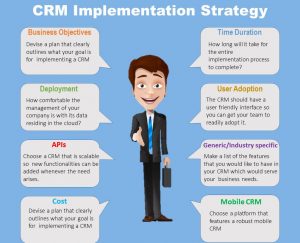CRM has become a real buzzword in today’s business world. Everyone is talking about it. everyone knows they can significantly benefit from it. Yet, only a few know which solution fits their business model the best. There is no denying the fact that CRM helps businesses from all industry verticals an example of this is CRM for Insurance industries or be it healthcare, financial, manufacturing, retail, etc. establish closer connections with customers and make data-driven decisions by organizing and centralizing customer data. Enterprises are eager to invest in CRM technology as part of a determined effort to grow their customer base. However, without proper direction and strategy, such initiatives might not bring optimal results and hence a clear roadmap outlining the CRM Implementation Process first needs to be chalked out.
There are various questions that you need to ask yourself before you start reaching out to CRM vendors. By having clear and concise answers to those questions, you will be able to clearly define your needs and follow CRM implementation best practices that will help your business grow by leaps and bounds.
Business Objectives
What is the driving force that has compelled you to start thinking about investing in this technology? What do you hope to achieve by adopting a CRM solution? Some are more interested in automating tasks while others desire to take advantage of the reporting and analytics features present in a CRM. Discuss the proposal with your Sales, Marketing, IT and Customer Service team, get their feedback and then devise a plan that clearly outlines what your goal is for implementing a CRM. Once you have adequately defined the problems that your organization is facing without a CRM, you can easily select the CRM that will help overcome those complications.
Time Duration
How long will it take for the entire implementation process to complete? Should it be done in one go or should you start with the basic functionalities and then add more features in subsequent phases? The answer to these questions will depend on various factors such as your company’s size, number of users, location of your existing data, etc.
Deployment: On-Demand vs On-Premise
On-premise is considered the traditional way of CRM deployment since you get it installed locally on your own network. Cloud-based CRM, on the other hand, is a few steps ahead in terms of technology as the program and its data is stored in the cloud and is deployed to the customer via the Internet. However, there are still decision-makers out there who get intimidated when advised to make the transition from on-premise to cloud-based CRM due to Cloud Security Concerns. The final decision will be made based on how comfortable the management of your company is with its data residing in the cloud.
User Adoption
Initially, the employees will not be very receptive to the idea of undergoing training in order to be able to use a new software. Many would think that the CRM would make their processes more complex and that they are better off doing things the old way. If the CRM is too complex and cumbersome, employees will not embrace the technology with an open heart. The CRM software should have a user-friendly interface so that you can get your team to readily adopt it. Moreover, you need to ensure that adequate training is provided to update the knowledge and skills of each employee in order to get the best results from the CRM technology.
APIs
API stands for Application Programming Interface. The basic function of an API is that it allows different software programs to interact with each other and mold their best features together.
This opens the window for seamless CRM Integration with third-party apps such as Accounting, eCommerce, Social Media, ERP, Online Web Portals, Databases, etc. so that you can get a 360-degree customer view.
Hence, you should choose a CRM that is scalable and flexible so that new functionalities can be added whenever the need arises.
Generic or Industry Specific
Whether you choose a generic or an industry-specific CRM will depend on the industry that your business operates in. There are some industries e.g. the healthcare industry that demand a highly customized solution due to sophisticated processes and therefore a generic CRM will provide little value to an organization operating in such an industry.
You should make a detailed list of the primary features that you would like to have in your CRM which would serve your particular business needs.
Cost
Truth be told, CRM implementation can be quite expensive if the required homework is not done. Even more painful is the fact that many companies start realizing that they paid much more on their CRM and want to switch to less expensive options when they don’t see the desired ROI. But if meticulously planned, a company can significantly reduce costs.
One way of doing this is to opt for cloud CRM where you can pay on a subscription basis, do not incur any maintenance costs and do not require a team of IT experts to keep the system up and running.
Mobile CRM
What if your salespeople are out on the road or away on a business trip? Does this mean they won’t be able to conduct business as usual? Well, no business can afford such a scenario and that is exactly why mobile CRM is the need of the hour. Having your sales team equipped with a mobile CRM not only offers a degree of flexibility but is also a proven way to increase sales.
Therefore, choose a platform that features a robust mobile CRM.
Infographic
Bottom Line
Planning is the key to a successful CRM deployment. A CRM that is tailored to your exact needs and processes can empower you to focus all your energies on your customers. There is always some risk associated with embracing new technology but we are in the midst of a technological renaissance and you simply cannot afford to ignore these advances. Once you have precise and definitive answers to the critical questions asked in this post, your CRM implementation strategy is bound to succeed. Once that happens, you can simply blame us for your increased profits.
Rolustech is a SugarCRM and Salesforce Partner Firm. We have offered our CRM consultancy services to more than 700 satisfied clients globally and helped them with CRM Implementation, Integration, Customization, Maintenance and Support. Get in touch for a Free Business Analysis now!







